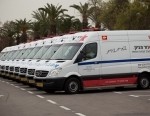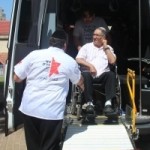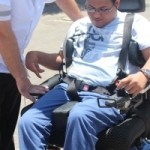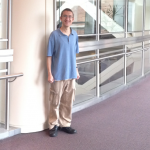“Books are great,” says Matityahu Kreitman, “but I wanted to get a feel for the real thing. I’m a pre-med student and, of course, I have tons of material to learn but I was anxious to develop a real understanding of the patient and, for that, I needed real patients.”
 My chance came in the summer, a perfect time to fulfill my ‘volunteer hours’. I chose Ezer Mizion’s Ambulance Division. They provide transportation for the elderly and the disabled. It’s hard for me, a young guy, to imagine. When I want to go somewhere, I just go. It’s hard to get my head around the concept of someone not being capable of getting where he has to be. Like an eighty-four year old man who needs ten minutes to get up from his chair, go across the kitchen to the refrigerator to get a fruit and then, ever so slowly, make his way back. Should he forget to bring a knife, it’s a major effort to get up again to retrieve it.
My chance came in the summer, a perfect time to fulfill my ‘volunteer hours’. I chose Ezer Mizion’s Ambulance Division. They provide transportation for the elderly and the disabled. It’s hard for me, a young guy, to imagine. When I want to go somewhere, I just go. It’s hard to get my head around the concept of someone not being capable of getting where he has to be. Like an eighty-four year old man who needs ten minutes to get up from his chair, go across the kitchen to the refrigerator to get a fruit and then, ever so slowly, make his way back. Should he forget to bring a knife, it’s a major effort to get up again to retrieve it.
How can a person like that go to the doctor on his own? And what about the wheelchair-bound lady who was injured in a terror incident? She needs physical therapy three times a week. How can she get there? That’s what Ezer Mizion’s Ambulance Division does. At least, that what I understood that they do before I started my volunteering stint. I knew that they get the patients from here to there. I’d get to meet the patients and become familiar with the clinics and hospitals. That sounded great. Little did I know that they do so much more.
And what about the wheelchair-bound lady who was injured in a terror incident? She needs physical therapy three times a week. How can she get there? That’s what Ezer Mizion’s Ambulance Division does. At least, that what I understood that they do before I started my volunteering stint. I knew that they get the patients from here to there. I’d get to meet the patients and become familiar with the clinics and hospitals. That sounded great. Little did I know that they do so much more.
On my first day, I met Motti. He’d be one of the people I would be working with. He’s the type of person who considers it his life’s mission to make others feel good. As the summer drew on, I saw that his style was typical of others at Ezer Mizion. They all seem to be cut out of the same mold that says: I care. Motti was energetic-always ‘going somewhere’ and his destination always seemed to be to benefit other people. He did everything to make me feel comfortable in my new job.
First came the ground rules. Some I was told. Other things I just absorbed from being around Motti and the others. I learned that a patient was not a case but a real person. The drivers knew many of the patients from previous trips and remembered what they had discussed. To one they might ask how his cough was doing. To another if the landlord fixed his kitchen sink. To a third they would ask if his daughter had her baby yet and to a fourth what he thinks of the latest political news.
How did they remember each patient? Motti and the others didn’t have to use a notebook. When someone really cares, he remembers. And each Ezer Mizion driver really cared. Motti would sometimes play Jewish geography with patients and loved seeing the grin on the patient’s face when they found a  relative or friend that they both shared. As he brought a patient home, he would end the trip with a sincere, “Have an amazing day!” that warmed the patient through and through.
relative or friend that they both shared. As he brought a patient home, he would end the trip with a sincere, “Have an amazing day!” that warmed the patient through and through.
Motti was religious but never was there a difference in his treatment of religious or secular people. To him, they were Jews and Motti loves all Jews. I witnessed this same friendly demeanor towards an Arab patient. “Why not?” he answered my unspoken question. “He’s a human being.” I was gratified to hear the Arab praise the Jewish nation to the skies.
Motti’s attitude even extended towards me. How many times did he try to make sure that I was comfortable with each patient maneuver. Would I like to rest before attempting the next landing? Can I manage it this way or should we do it that way?
Often a worker’s attitude is how can I do the least and get the most. Not at Ezer Mizion. The attitude is just the opposite and, you know something, the people at Ezer Mizion seem so much happier than the average worker who is often seen complaining about this and that. The mindset here is always what is best for the patient.
How many times did I see Motti come down after bringing an overweight patient down three flights of curving stairs. He’d be sweating a lot and he’d ask the patient, ” OK, what will it be? High air conditioning, low or none.” Should the answer be, “None,” without missing a beat, Motti would reply, “OK. You’re the boss. Whatever you say.” Then he’d begin his friendly chatting to make the patient feel good. Never, not even once, did I witness a slight hesitation or resentment in his reply.
And so yes, I got to really know the patients and yes, I became familiar with the clinics and hospitals but at the end of the summer I gained perspectives that I hope to emulate and take with me throughout my medical career and in my life ahead.
Thank you Ezer Mizion for the valuable lessons I learned from you this summer.
